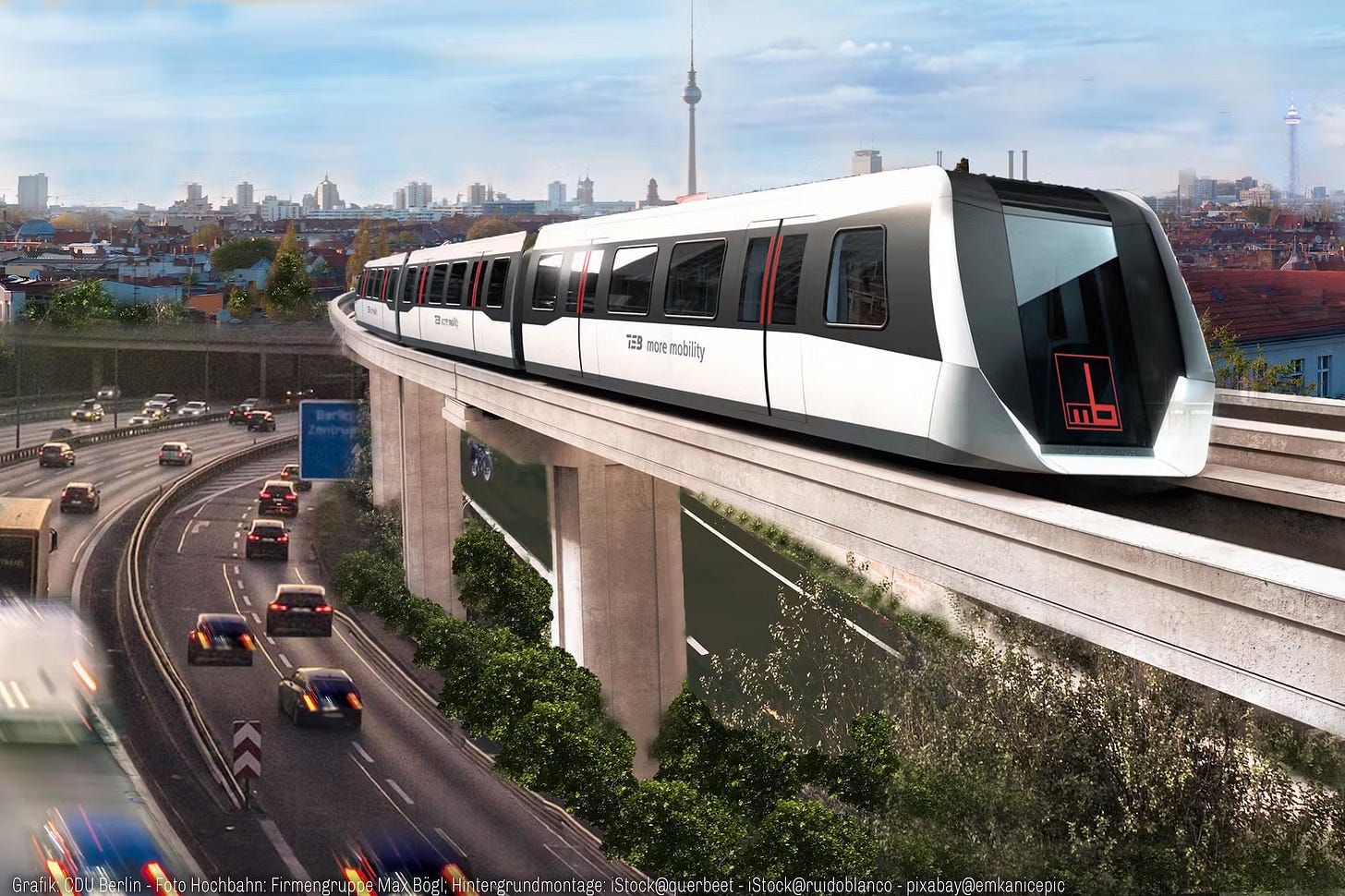#232: Maglev train, lost €60 billion, no to e-scooters, Spandau occupation
It's X-mas market time
Dear 20 Percent,
Since I was a kid, I’ve loved maglev trains, or at least the idea of them. Fast, floating, silent, futuristic. Driverless, of course. We were supposed to be riding around in these things by 2023, right? If Berlin’s CDU-led government gets its way, we could be doing just that within a few years.
On Monday, it announced it’s earmarked €80 million for a pilot project that will be able to transport passengers and cargo. A project team is already looking for a place to build a 5-to-7km track. Suggested routes so far include a ring around Tempelhof (not sure how that would go down) and a line between Hauptbahnhof and ex-Tegel airport.
Not everyone’s as excited as my inner six-year-old.
“A completely pointless pipe dream,” said Jens Wieseke from the Berlin passenger association IGEB. “They’ve now completely lost it at the CDU.”
Expanding the tram network would be far more cost effective, critics are saying. The problem with trams, from the CDU’s perspective: they take away precious street space from … you guessed it … cars. They say this openly. Until now, the CDU had favoured extending the U-Bahn network. Now they’re saying the above-ground maglev would be cheaper to build. And it also won’t take road space away from cars!
Markus Hecht, who teaches rail tech at TU, isn’t convinced:
“I am very surprised that the focus here is on a new technology and not on the question of what transport needs should be met in the future.”
It’s worth pointing out that the city has already tried out a maglev. West Berlin built the M-Bahn from Gleisdreieck up to Kemperplatz, site of today’s Center am Potsdamer Platz, aka the Sony Center. It was a bumpy ride. The train was damaged in an arson attack in 1987. A year later, a driverless train failed to brake on time and overshot the Kemperplatz platform. The M-Bahn carried passengers from 1989-1991 but the reunification of Berlin killed the project as funds were needed to patch up the fragmented U-Bahn network.
More news below!
Maurice
This humble newsletter is the future of Berlin news, though. Support us with your hard-earned euros … or visit our sponsor Get Safe and finally get that liability insurance you’ve been putting off forever.
€60 bln f**k-up
We usually avoid the dry politics of the federal budget but this is big and could de-rail Chancellor Scholz’s SPD-Green-FDP government aka “the traffic light” coalition. In a nutshell, Germany’s highest court ruled last week that a €60 billion special fund to tackle climate change was unconstitutional. Unspent cash from an emergency corona fund was repurposed as the climate fund, a centrepiece of the green transition the government says is urgently needed. Unfortunately, the plan was riddled with inconsistencies. Besides money for new rail infrastructure and green energy projects, €10 bln was a bribe subsidy to ensure an Intel chip plant gets built in Magdeburg. The court found the fund violated the “debt brake” rules enshrined in the German constitution. The coalition is scrabbling to find the money elsewhere — and the finance ministry, run by austerity fan Christian Lindner (FDP), has announced a budget freeze on new, non-obligatory projects. It’s going to be a long winter. I’d be surprised if the coalition survives until the next elections in 2025.
No to e-scooters
58% of people who took part in an online survey by the Eberswalde University for Sustainable Development want to ban shared electric kickscooters in Berlin. People’s main concern was riders randomly dumping the vehicles on sidewalks and bike lanes. 40% of respondents said they have used a share-scooter at least once. The survey suggested that most journeys were short (1-3km) and in tandem with public transport or instead of a bike but didn’t replace car journeys. Unfortunately, the survey was “not representative” meaning “inaccurate”. IMHO, as long as scooter-giant TIER is headquartered in Berlin, the city’s never going to dare to ban the things.
Spandau city hall occupied
We don’t write about Spandau much but all hell broke out in the sleepy outer borough when, on Friday, around 50 people marched into the district’s city hall and occupied the offices of councillor Thorsten Schatz (CDU) for an hour. What for? The protesters were carnies who run a fair on a vacant lot near the train station and the district placed strict noise limits on the fair following resident complaints. According to Tagesspiegel, the occupiers threatened security guards with a pipe wrench and verbally assaulted district employees. Police had to be brought in to break up the protest. Berlin’s “fairground king” Thilo-Harry Wollenschlaeger offered a different perspective: “It wasn't a storming of the town hall, it was quite civilised. It wasn't a mob with weapons, it was families with stuffed toys.”
Factoid

Christmas markets have their origins in Bavaria but Berlin was in on the game early: the first known Weihnachtsmarkt took place around 1530 on Petriplatz and surrounding streets. These days, there are dozens out there — for every taste and budget — from the LGBTIQA Winterdays on Nollendorfplatz to the Medieval Christmas Market at RAW in Friedrichshain, from the Holy Shit Shopping design market to the Dog Christmas Market in Grunewald. Personally, I’m a fan of the low-key Heissa Holzmarkt on the banks of the Spree.
⭐⭐⭐Visit our sponsor!⭐⭐⭐
Stop procrastinating, get liability & contents insurance already!
Liability insurance covers the financial costs if you accidentally cause damage to someone else, their property or their assets.
Contents insurance covers all your belongings in your flat against risks like fire, leaks or burglary.
With Getsafe, you can buy both in just a few minutes – all in English via the Getsafe app.
It’s already dark outside, it’s not like you were gonna go do something else right now.



